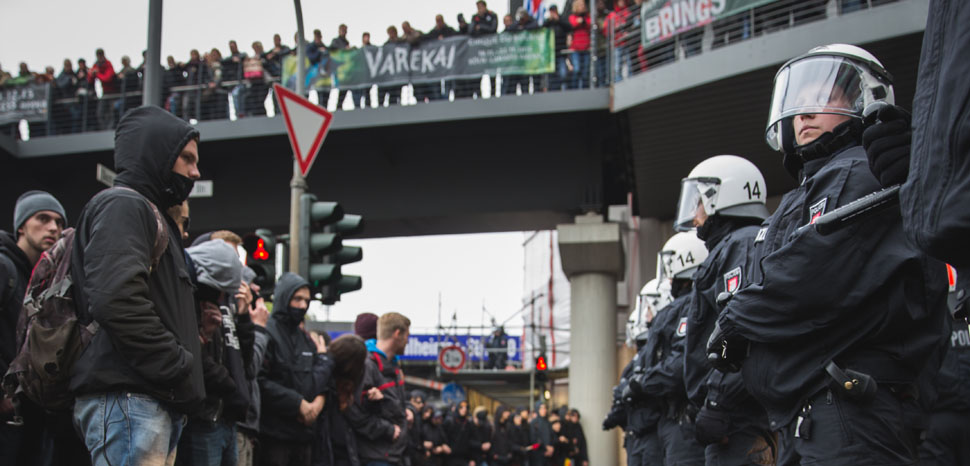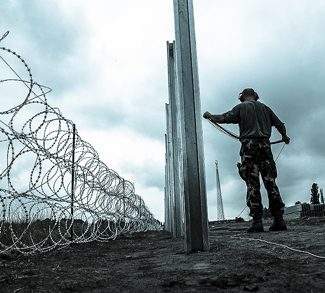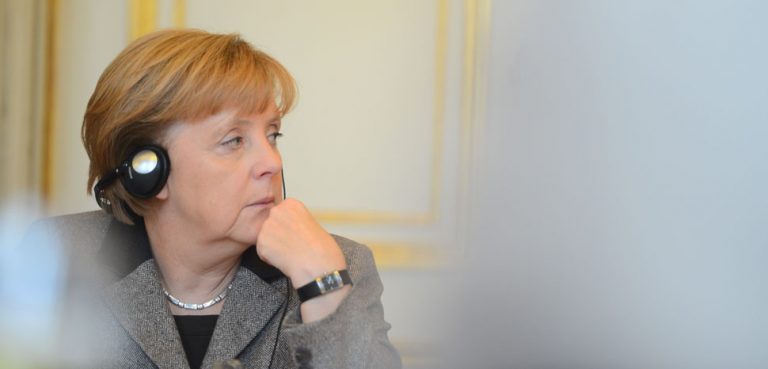The end of the Cold War did not bring the end of the history as Francis Fukuyama predicted. Rather, the bipolar world spread out into a multipolar world, dividing along civilization lines as depicted by Samuel Huntington. The 9/11 attacks, the surge of Islamist terrorism, as well as the Rohingya persecution or ethnic clashes in India are few crystal-clear examples of this civilization clash. In my previous article, I depicted how the clash of civilizations affects the US-Turkey relationship. Violence is rising in every corner of the world, with a sectarian trend more and more important in every society and at each level of society. Even though one of the most difficult situations remains that of Christians in Muslim countries, based on a 2018 Open Doors Report, it is also important to recognize that Muslims are facing increased Islamophobia worldwide, such as the Rohingya people in Myanmar. Recent reports also show an increasing trend of antisemitism, not only coming from Muslim radicalism, but also in Europe from far-right extremist parties. The turmoil of the “new sectarian multipolar world” is affecting everyone, and the true victims are moderate and tolerant people around the world.
But if these civilizational tensions are spread across the globe, it’s Europe that is most vulnerable because of its demographic ageing and decreasing trend in population, especially in southern Europe, and because of its political weakness throughout the Continent. In this article I will explore two major dangers that Europe is facing in its fight to keep its democratic values alive: Russian meddling and the dilemma of inclusion.
Putin’s meddling amplifies anti-immigrant voices
Putin’s meddling in Western countries is already the subject of many articles and literature. Since the “informal invasion” of Crimea and East Ukraine, Russia has intensified a series of shadow activities in order to divide and/or influence the Western media, and by extension Western public opinion.
Among these “active measures,” there is the supporting of “friendly voices” in Europe in order to nurture political support within EU countries. For the most part, Putin’s “best friends” in Europe are far-right movements. They include: AfD, FPÖ in Germany, Greece’s Golden Dawn, Hungary’s Jobbik, France’s Front National, Italy’s League, the United Kingdom Independence Party (UKIP), and Belgium’s Vlaams Belang (VB). On the far left, the most pro-Russian parties are Cyprus’s AKEL, Germany’s Die Linke, the Czech Republic’s KSCM, Podemos in Spain, and Syriza. The Italian Five Star Movement and the Human Shield Party in Croatia all belong to the pro-Russian camp.
Here I would like to focus on the fact that the main strategy Russian likes to use is to leverage fear against the immigrant, which is the main leitmotif of far-right parties. Among the most documented cases is “Operation Liza,” which happened in Germany, in which Liza, a 13-year-old Russian-German girl returned one day after her disappearance on 11 January. Her family claimed that she had been abducted and raped by Muslim Arabs. This assertion led to demonstrations by Russian-speaking Germans, while Russian media tried to amplify the propaganda against Germany, underlining how the government failed to keep its citizens safe. The affair was presented as proof of the weakness of current government, giving momentum and added voice to the anti-immigrant parties, such as the far-right AfD, which itself promoted the story in attempt to gain consensus among Germans. In the end, Liza admitted to making up the story.
If anti-immigration xenophobia is intolerable and anti-democratic, then these far-right movements are acting against their own national interest, being used as puppets in a Russian strategy against the “progressive camp.” Democratic parties also failed because they don’t do enough to promote a sense of security among their citizens. If the Russians are able to leverage the fear of the European people against immigrants, it’s because people in Europe have expressed a sentiment of insecurity, especially when they see other leaders around the globe take a strong position in order to defend their culture and values, as Putin in Russia or Erdogan in Turkey. Why this sense of insecurity that has not been addressed by the mainstream European parties? Here we come to the “dilemma of inclusion” that moderate and left-leaning parties in Europe are facing.
The dilemma of inclusion
The “dilemma of inclusion” comes from research by Rafaela Dancygier, associate professor of politics and international affairs at Woodrow Wilson School, Princeton University. Dancygier specializes in comparative politics, with a focus on the implications of ethnic diversity in advanced democracies. In her book she explains that the easiest Muslim voters for a party to attract, and those who will offer the most electoral advantage, tend to be those who are geographically concentrated—and thus also the least assimilated and most conservative. Reading between lines it means that left and progressive parties, maybe in their attempt to switch their traditional urban “working class” base with “ethic minorities” are trying to gain consensus from Muslim minorities even if there is a conflict of interest between the conservative Islamic values of this new electorate and the traditional values that these parties have always defended, even in past against the Christian Church, such as the fight for gender equality and against homophobia.
Let’s take the case of the Turkish community in Germany as example, where around 1.55 million people hold Turkish citizenship according German official statistical institute. A poll in 2016 showed that around 94% of Turkish-German vote went to left political parties, but during the Turkish constitutional referendum of 2017, 63% of German Turks voted in favor of Erdogan’s reforms, reinforcing his leadership and his Islamist-conservative view of Turkey and the de-facto creation of a strong one-man state through to 2024. If we consider that the referendum passed with 51.18%, we can say that, surprisingly, the largest Turkish communities in Europe appeared to be more conservative than those living in their own home country. This suggests that Turkish-Germans are left-leaning and progressive concerning Germany’s affairs but conservative and Islam-oriented concerning Turkey’s affairs.
This example shows in practice what Immigration Policy Lab cites as the main challenge for left-leaning progressive parties in Europe when it asks: Can Europe’s left-wing parties pursue Muslim voters without undermining their liberal values?
Conclusion
These facts and the wave of migrations from Libya and Syria have created concerns, fear, and xenophobia among Europeans, fueling the idea of a “demographic Jihad” that views Muslim communities as a Trojan Horse of Islamism inside our European society. These fears have also been reinforced by messages from certain influential Muslim leaders, like for example Erdogan in his message to Muslims living in Germany: “The places where you work and live are your homelands and new countries now… Drive the best cars. Live in the most beautiful houses. Make five children — not just three. For you are the future of Europe.”
The mainstream and more moderate parties have not taken clear actions in order to reassure people that such conservative Islamist tendencies will not be tolerated among our societies, and rather than say that the Christian values of Europe will be respected they prefer to say that secularism will be defended, which is more politically correct but less emotionally incisive.
The reason why moderate parties fail to reassure the population is that some of these moderate parties are trying to appeal to Muslim voters, even if these communities display clear conservative views in contrast with said party’s other progressive views. Moderate right parties will also point out the importance of immigration for the proper functioning of the labor market (… and to maintain the low cost of labor, especially in unqualified jobs).
As a result, extremist parties are able to take advantage of fears among citizens in order to promote themselves as the only real defender of European values. Russian propaganda then steps in and helps these parties, as it did for the Liga in Italy and the Front National in France. For these parties, and the people belonging to these parties, Putin is the example of a true leader who is able to defend national values and tradition, just as Pravda – the historical mouthpiece of the Soviet Communist Party – trumpeted in 2016.
In order to avoid a democratic crisis in Europe, it is important that each political party take care of its electoral base. Far-right parties should stop supporting Russia as Russia has attacked Ukraine and consequently the Western sphere of influence, just as some communist parties stopped supporting the Soviet Union after its invasion of Hungary in 1956. At the same time, left parties should try to filter the Muslim communities they’re appealing to: support and integrate the more moderate and hardworking Muslims and isolate/denounce the conservative tendencies that go against societal norms.
We must further investigate the links between political parties and the “psychology” of their electoral base in order to understand the weakness of our society and avoid foreign powers being able to use these weaknesses against ourselves, jeopardizing the basis of the Western democracy. Finally, we should not forget that at the end of day, the true enemy of the West is the power-hungry nature of our own political parties, and for this reason we should learn to reject extremist positions and intolerance based on baseless theories, as well as be much stronger defenders of our values and political tradition.
The opinions, beliefs, and viewpoints expressed by the authors are theirs alone and don’t reflect any official position of Geopoliticalmonitor.com.




